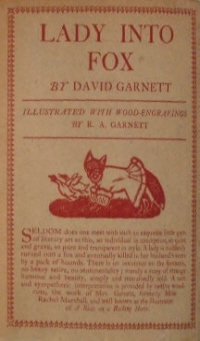 Dust-jacket from the first edition Dust-jacket from the first edition | |
| Author | David Garnett |
|---|---|
| Language | English |
| Genre | Fantasy novel |
| Publisher | Chatto and Windus |
| Publication date | 1922 |
| Publication place | United Kingdom |
| Media type | Print (Hardback) |
| Pages | 91 pp |
Lady into Fox was David Garnett's first novel using his own name, published in 1922. It won the James Tait Black Memorial Prize, and the Hawthornden Prize a year later.
Plot summary
Silvia Tebrick, the 24-year-old wife of Richard Tebrick, suddenly becomes a fox while they are out walking in the woods. Mr. Tebrick sends away all the servants in an attempt to keep Silvia's new nature a secret, although Silvia's childhood nurse returns. While Silvia initially acts human, insisting on wearing clothing and playing piquet, her behaviour increasingly becomes that characteristic of a vixen, causing the husband a great deal of anguish. Eventually, Mr. Tebrick releases Silvia into the wild, where she gives birth to five kits, whom Tebrick names and plays with every day. Despite Tebrick's efforts to protect Silvia and her cubs, she is ultimately killed by dogs during a fox hunt; Tebrick, who tried to save Silvia from the dogs, is badly wounded, but eventually recovers.
McSweeney's Collins Library imprint republished Lady into Fox in 2004.
Reception and influence
Rebecca West described Lady Into Fox as one of the "best imaginative productions" of the decade.
The success of the novel resulted in several imitations. They included a parody by Christopher Ward (1868–1943) Gentleman Into Goose (1924), while Vercors' homage Sylva (1961), depicts a fox transforming into a woman.
Adaptation
In 1939, British choreographer Andrée Howard created a musical work of the same name based on Garnett's book for Ballet Rambert. Sally Gilmour dancing Silvia Tebrick assured the ballet's success. The music was an arrangement of piano pieces by Arthur Honegger (Sept pièces brèves and Toccata et variations), setting and costumes designed by Nadia Benois.
References
- "Thus it happens that all the best imaginative productions of the last decade in England – Walter de la Mare's "Memoirs of a Midget", David Garnett's "Lady Into Fox", Sylvia Townsend Warner's "Mr. Fortune's Maggot", A. E. Coppard's "Best Short Stories" and Virginia Woolf's "Orlando" – have all been in the nature of fantasies". Rebecca West, "A London Letter", The Bookman, May 1929, (p. 293).
- Neil Barron, Fantasy and Horror : a critical and historical guide to literature, illustration, film, TV, radio, and the Internet. Lanham, Md. : Scarecrow Press, 1999. ISBN 0810835967 (p. 116)
- "Judith Mackrell on David Garnett's Lady Into Fox". the Guardian. 8 November 2006. Retrieved 19 March 2015.
- Oxford Dictionary of Dance 2000. p. 283
- Deryck Lynham: Ballet Then and Now – A History of the Ballet in Europe (Sylvan Press, 1946) p. 154
External links
- Lady into Fox at Standard Ebooks
- Lady into Fox at Project Gutenberg
 Lady into Fox public domain audiobook at LibriVox
Lady into Fox public domain audiobook at LibriVox
This article about a 1920s fantasy novel is a stub. You can help Misplaced Pages by expanding it. See guidelines for writing about novels. Further suggestions might be found on the article's talk page. |